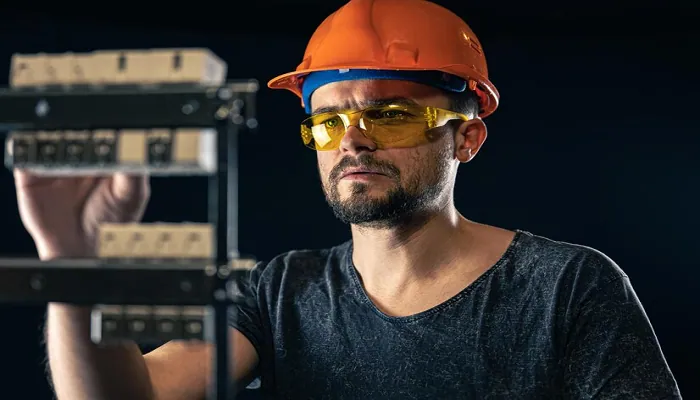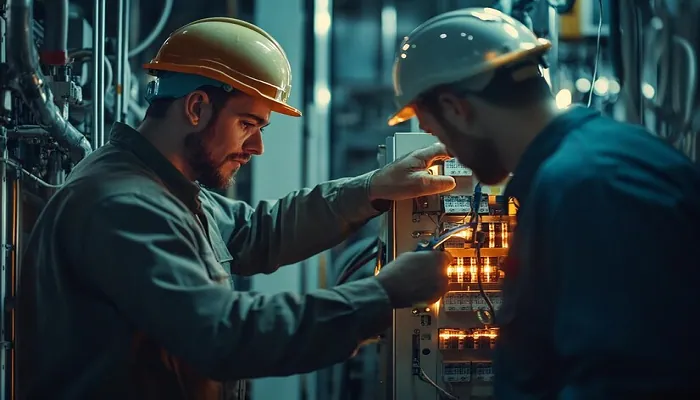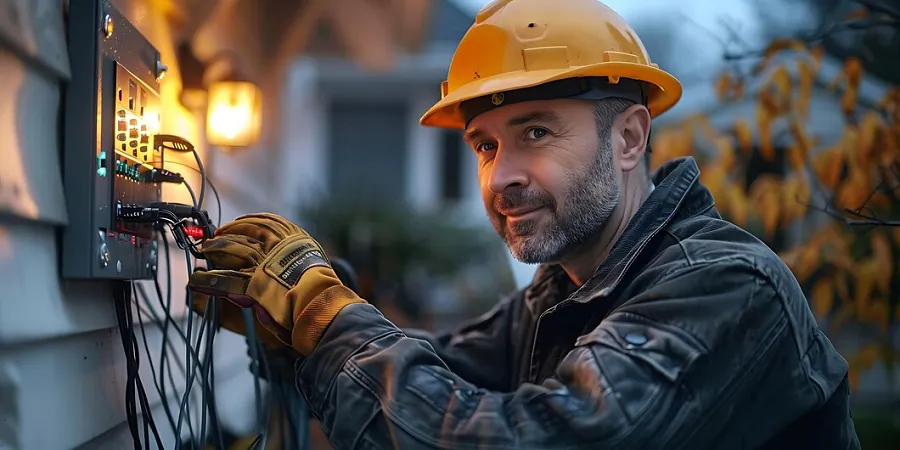Overview of Independent Electrical Contractors
Independent electrical contractors play a vital role in both residential and commercial projects. They are professionals who work independently or run their own small businesses, offering a wide range of electrical services. These can include installations, repairs, upgrades, and maintenance of electrical systems. Unlike electricians who work for larger companies, independent contractors have the flexibility to take on projects of various sizes and provide more personalized services to clients.
Whether it’s wiring a new home, installing energy-efficient systems, or repairing faulty electrical components, independent contractors are skilled in handling different electrical tasks. They often work directly with homeowners, business owners, or construction teams to ensure the job is done correctly and safely.
Purpose of the Post
This post aims to explore the key responsibilities, benefits, and challenges faced by independent electrical contractors. We will look at how they differ from electricians who are employed by companies, and why many people choose to hire them for their electrical needs.
We’ll also discuss the advantages of working with independent contractors, such as flexibility and personalized service. At the same time, it’s important to recognize the challenges they face, from keeping up with industry regulations to managing their own businesses. Understanding these aspects can help clients make informed decisions when selecting an electrical contractor for their projects.
By the end of this post, you will have a clearer understanding of what independent electrical contractors do, the value they bring, and how to choose the right one for your specific electrical needs.
What Are Independent Electrical Contractors?

Definition of Independent Electrical Contractors
Independent electrical contractors are electricians who run their own business or work independently, rather than being employed by a large electrical company. They handle all aspects of their projects, from planning to execution, and are responsible for managing their own schedules, clients, and business operations. Unlike electricians who work for larger firms, independent contractors have the freedom to choose which jobs they take on, allowing them to focus on specific types of projects or offer personalized services.
Difference Between Independent Contractors and Company-Employed Electricians
The key difference between independent contractors and electricians who work for a company is autonomy. Independent contractors are self-employed, meaning they handle everything on their own, including marketing their services, managing client relationships, and ensuring compliance with local electrical codes. On the other hand, company-employed electricians usually work under a supervisor, with jobs and tasks assigned to them. While both types of electricians perform similar technical work, independent contractors often provide more flexibility and direct communication with their clients.
Common Services Provided by Independent Electrical Contractors
Independent electrical contractors offer a wide range of services, including:
- Wiring and Installation: Installing electrical systems in new homes, offices, or buildings, which includes wiring, circuit breakers, and lighting systems.
- Repairs and Troubleshooting: Fixing electrical issues such as faulty wiring, blown fuses, or malfunctioning outlets.
- Upgrades: Upgrading electrical systems to handle more power, install energy-efficient systems, or improve safety.
- Maintenance: Conducting regular checks and maintenance to ensure the electrical systems are functioning properly.
- Special Projects: Working on custom projects such as installing smart home systems, solar panels, or advanced lighting solutions.
These contractors provide essential services to homeowners and businesses, helping them maintain safe and functional electrical systems.
Skills and Qualifications

Required Certifications and Licenses for Independent Electrical Contractors
To become an independent electrical contractor, there are essential certifications and licenses needed. First, they must complete an apprenticeship or technical training program to gain hands-on experience in electrical work. After that, they typically need to pass a licensing exam to work legally in their region. The specific requirements may vary depending on the country or state, but a valid electrical license is essential to ensure safety and compliance with local regulations.
In many areas, independent electrical contractors also need to carry liability insurance to protect themselves and their clients in case of accidents or damage. Additionally, they may require special certifications if they want to work on complex systems like solar panel installation or smart home electrical systems.
Importance of Ongoing Training and Staying Up-to-Date with Industry Standards
The electrical industry is constantly evolving, with new technologies and standards emerging. This makes ongoing training a critical part of being an independent electrical contractor. Staying up-to-date on the latest techniques, safety codes, and advancements in electrical systems is important to ensure the work is safe, efficient, and compliant with local building codes.
Many contractors take part in continuing education programs, seminars, and workshops to expand their knowledge. This also helps them keep their licenses valid, as many regions require periodic updates for certification renewal.
By staying current with the latest industry trends, independent electrical contractors can offer their clients the best possible services, including energy-efficient solutions and modern electrical system installations. Ongoing training ensures contractors remain competitive and maintain high-quality standards in their work, which builds trust with clients and sets them apart from others in the field.
Benefits of Hiring Independent Electrical Contractors

Flexibility in Services and Scheduling
One of the main advantages of hiring independent electrical contractors is the flexibility they offer in both services and scheduling. Unlike larger companies that may have strict schedules and set service packages, independent contractors can often adapt to the specific needs of their clients. This allows them to take on jobs of various sizes, from simple repairs to more complex installations. Clients can also benefit from flexible scheduling, as independent contractors are often more accommodating with appointment times, which can make it easier to get work done without disrupting daily routines.
Personalized Service and Client Relationships
Another benefit of hiring an independent electrical contractor is the personalized service they provide. Since they often work on a smaller scale compared to large companies, independent contractors can build closer relationships with their clients. This one-on-one interaction allows them to better understand the client’s needs and preferences, leading to more tailored and satisfactory solutions. Independent contractors are also more likely to follow up and ensure their clients are happy with the work, which strengthens trust and results in repeat business.
Cost Advantages Compared to Larger Companies
Hiring an independent electrical contractor can often be more cost-effective compared to working with a larger electrical company. Independent contractors typically have lower overhead costs because they don't maintain large offices or staff, allowing them to offer competitive pricing. Clients can receive quality work without paying the higher fees that may come with larger firms. For many homeowners or small businesses, this cost advantage makes independent contractors an appealing option, as they can get professional services at a more affordable rate.
Common Projects Handled by Independent Electrical Contractors

Residential and Commercial Electrical Installations
Independent electrical contractors often handle a wide range of electrical installations for both residential and commercial properties. This can include setting up wiring systems for new homes, offices, or shops. They install lighting systems, electrical outlets, and circuit breakers to ensure everything works properly and safely. Whether it’s a small home renovation or a large commercial project, independent contractors are equipped to handle electrical installations of various sizes and complexities.
Electrical Repairs, Upgrades, and Maintenance
Another key service provided by independent electrical contractors is electrical repair, upgrades, and ongoing maintenance. When something goes wrong, such as a power outage, faulty wiring, or a broken switch, these contractors are called in to diagnose and fix the issue. They also perform upgrades, like replacing outdated electrical panels, adding more outlets, or installing energy-efficient lighting. Additionally, regular maintenance is important to keep electrical systems running smoothly, and independent contractors often offer these services to prevent problems before they occur.
Specialized Projects (Smart Home Installations, Energy-Efficient Solutions)
Independent electrical contractors are increasingly involved in specialized projects, such as smart home installations and energy-efficient solutions. With the rise of smart home technology, more homeowners are looking to integrate automated lighting, security systems, and other smart devices. Independent contractors can help with these installations, ensuring everything is correctly wired and integrated. They also assist with installing energy-efficient systems, such as LED lighting or solar power solutions, helping clients reduce their energy consumption and save on bills. These specialized services showcase the versatility of independent contractors and their ability to meet the evolving demands of modern electrical needs.
Challenges Faced by Independent Electrical Contractors

Navigating Complex Electrical Regulations
One of the main challenges faced by independent electrical contractors is the need to stay compliant with constantly changing electrical codes and regulations. Electrical work is heavily regulated to ensure safety, and contractors must be aware of the latest updates in local, state, and national guidelines. Navigating these complex regulations requires continuous learning and understanding of the rules to avoid fines, delays, or unsafe installations. Ensuring that every job complies with these standards is both time-consuming and essential for their business.
Managing Business Operations
Independent contractors not only need to be skilled in their electrical work, but they also have to manage the business side of things. This includes handling customer service, scheduling appointments, managing budgets, and ensuring timely payments. Many independent contractors work on their own or with small teams, which means they juggle various responsibilities, from marketing to financial management. Keeping track of all these tasks can be overwhelming, especially when trying to maintain a steady workflow and provide excellent customer service.
Competing with Larger Electrical Service Providers
Another major challenge for independent electrical contractors is competing with larger companies. Bigger electrical service providers often have more resources, such as marketing budgets, established reputations, and larger teams that can handle multiple projects simultaneously. Independent contractors must find ways to stand out, such as offering personalized service, flexible scheduling, or competitive pricing. While larger companies may have the advantage in scale, independent contractors can compete by focusing on quality work, building strong relationships with clients, and leveraging their flexibility to meet specific customer needs.
How to Choose the Right Independent Electrical Contractor

Factors to Consider: Experience, Certifications, and Client Reviews
When choosing an independent electrical contractor, one of the most important factors is their experience. Experienced contractors are more likely to handle various types of electrical projects efficiently and professionally. It’s a good idea to ask how many years they've been in the industry and if they've worked on similar projects. Certifications and licenses are also critical. Ensure the contractor has the proper qualifications to perform electrical work in your area, as this guarantees their work meets safety standards.
Additionally, client reviews can provide valuable insight. Look for feedback from previous customers to gauge the contractor’s reliability, work quality, and professionalism. Positive reviews or recommendations from trusted sources can help you make a confident decision.
Importance of Obtaining Quotes
Before hiring an independent electrical contractor, it’s essential to obtain quotes from a few professionals. This allows you to compare pricing and services, helping you avoid overpaying or choosing a contractor who cuts corners. Be sure to ask for detailed quotes that include a breakdown of costs such as materials, labor, and any potential additional fees. This ensures transparency and prevents surprises later on.
Ensuring Transparent Communication
Transparent communication is key to a successful working relationship with an independent contractor. From the start, they should clearly explain the scope of the work, estimated timelines, and potential challenges. It’s important to ensure they understand your expectations, and in return, you should be kept informed about any updates or delays. Open communication will lead to better outcomes, helping both you and the contractor stay on the same page throughout the project.
Independent electrical contractors provide valuable services for both residential and commercial projects. Their flexibility, personalized service, and expertise make them a great option for handling electrical installations, repairs, and upgrades. When choosing an independent contractor, it’s important to prioritize experience, certifications, and client reviews to ensure high-quality work. Hiring certified professionals not only guarantees safety but also ensures that the project is done efficiently and up to industry standards. For any electrical needs, selecting a skilled independent contractor is a smart investment for long-lasting and reliable results.

Comments